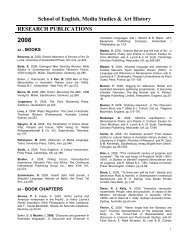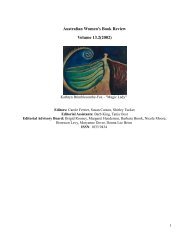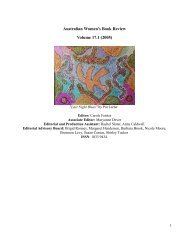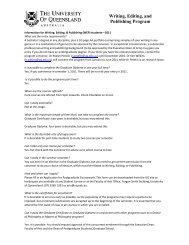Australian Women's Book Review Volume 14.1 - School of English ...
Australian Women's Book Review Volume 14.1 - School of English ...
Australian Women's Book Review Volume 14.1 - School of English ...
Create successful ePaper yourself
Turn your PDF publications into a flip-book with our unique Google optimized e-Paper software.
Although Probyn openly admits to passing over specific environmental concerns in favour <strong>of</strong> more<br />
diffuse questions <strong>of</strong> understanding, her approach does, nonetheless, underscore a vital focus for<br />
environmental discourse that has thus far been neglected. In dealing with those smaller, insidious<br />
actions hidden within the mundanity <strong>of</strong> eating, Probyn's rhizomatic exploration becomes a tool to cloud<br />
the logic <strong>of</strong> the worldview pictures <strong>of</strong> ethical existence. By informing a more subtle ecological<br />
sensitivity <strong>of</strong>ten neglected by environmental writing, Probyn's work inadvertently contributes to a<br />
developing paradigm <strong>of</strong> environmental consciousness: '[W]ays <strong>of</strong> living informed by both the rawness<br />
<strong>of</strong> a visceral engagement with the world, and a sense <strong>of</strong> restraint in the face <strong>of</strong> excess.'<br />
Although I applaud Probyn's endeavours at what she describes as 'smaller' scenarios rather than<br />
'generalised green politics', I also hope that her sojourn is but the first nibble at this particular rhizome.<br />
It's not that Probyn has inadequately critiqued the realms <strong>of</strong> traditional identity formation - sex, bodies,<br />
corporate culture … but that within the category <strong>of</strong> 'food' many neglected areas still exist. Eating is<br />
privileged within research, unfettered by links to all those less glamorous activities which make it<br />
possible. The emphasis on eating in Probyn's writing alludes to a more universal cultural emphasis on<br />
this consumptive practice, which results in little being written, for instance, about the growing <strong>of</strong> food.<br />
The colours and characters <strong>of</strong> food production are so easily washed out under the glare <strong>of</strong> celebrity<br />
chefs and shock/horror eating practices. In such a light, consigning food production to the shadows <strong>of</strong><br />
cultural research, remote edges <strong>of</strong> 'over-developed' cities, corners <strong>of</strong> backyards and the insides <strong>of</strong><br />
industrial sheds may be an understandable strategy. However, with 40% <strong>of</strong> the world's population<br />
facing a future with not enough water to grow their own food and famine currently spreading through<br />
parts <strong>of</strong> Aftrica, I contend that extending Probyn's question 'What does power taste like?' to these<br />
nether regions <strong>of</strong> food practice is a critical next step.<br />
Angela Hirst is doing PhD research in the Department <strong>of</strong> Architecture, Geography and Planning<br />
at the University <strong>of</strong> Queensland.<br />
57








